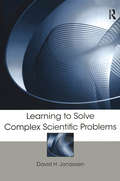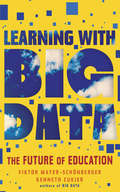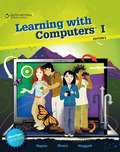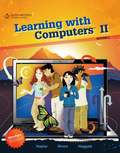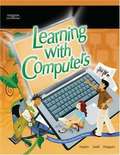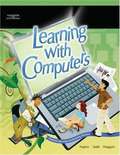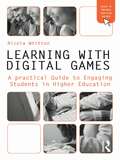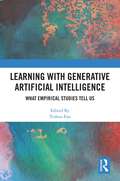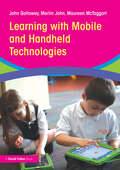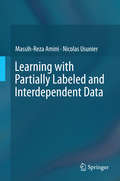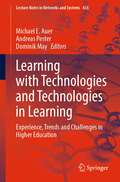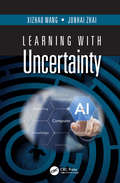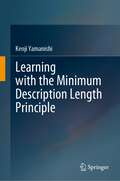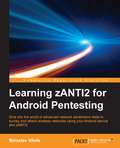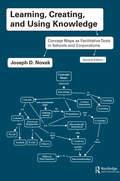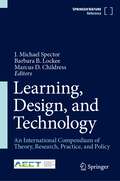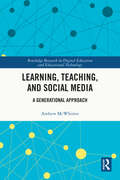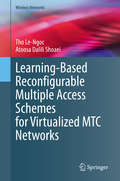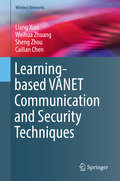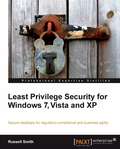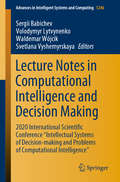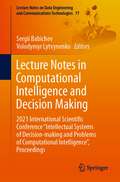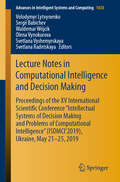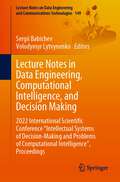- Table View
- List View
Learning to See: A Photographer’s Guide from Zero to Your First Paid Gigs
by David MolnarWhether you want to take better photos in your everyday life or make a full-time income as a photographer, the five-part framework author David Molnar teaches in Learning to See will work for you:See: have a vision for your shot and execute that visionShoot: become technically proficient with your cameraEdit: help re-create the emotion from the day of the shootDevelop: identify your area of focus for photographyEarn: start getting paid for your artIt&’s a proven process every photographer follows but few talk about. But if you use it, it will shave years off the learning curve he himself went through as an amateur photographer. This book teaches readers to learn to see, because in the end, that&’s what a photographer does: notice what other people often miss and understand how to capture those things in a masterful way.
Learning to Solve Complex Scientific Problems
by David H. JonassenProblem solving is implicit in the very nature of all science, and virtually all scientists are hired, retained, and rewarded for solving problems. Although the need for skilled problem solvers has never been greater, there is a growing disconnect between the need for problem solvers and the educational capacity to prepare them. Learning to Solve Complex Scientific Problems is an immensely useful read offering the insights of cognitive scientists, engineers and science educators who explain methods for helping students solve the complexities of everyday, scientific problems. Important features of this volume include discussions on:*how problems are represented by the problem solvers and how perception, attention, memory, and various forms of reasoning impact the management of information and the search for solutions;*how academics have applied lessons from cognitive science to better prepare students to solve complex scientific problems;*gender issues in science and engineering classrooms; and*questions to guide future problem-solving research. The innovative methods explored in this practical volume will be of significant value to science and engineering educators and researchers, as well as to instructional designers.
Learning with Big Data
by Viktor Mayer-Schönberger Kenneth CukierHomework assignments that learn from students. Courses tailored to fit individual pupils. Textbooks that talk back. This is tomorrow's education landscape, thanks to the power of big data. These advances go beyond the much-discussed rise of online courses. As the New York Times-bestselling authors of Big Data explain, the truly fascinating changes are actually occurring in how we measure students' progress and how we can use that data to improve education for everyone, in real time, both on- and offline. Learning with Big Data offers an eye-opening, insight-packed tour through these new trends, for educators, administrators, and readers interested in the latest developments in business and technology.
Learning with ComputersTM I
by H. Albert Napier Jack P. Hoggatt Ollie N. RiversThe new second edition LEARNING WITH COMPUTERS I (Level Green, Grade 7) is a revision of the first edition project-based text to cover Microsoft Office 2007 and 2010. There is also a companion text, LEARNING WITH COMPUTERS II (Level Orange, Grade 8). This series for middle school students delivers a strong foundation in keyboarding and computer applications. In this project based text, students are introduced to the Explorers Club where four young members of the club - Luis, Ray, Julie, and Lin - guide students on Microsoft Office explorations. Along the way, each student keeps a personal journal about their explorations. The text offers multiple opportunities to reinforce and maintain basic keyboarding, word processing, spreadsheet, presentation, database, graphics, and Internet skills. Students are also introduced to new grade-level appropriate computer skills based on the National Educational Technology Standards (NETS). Additionally, the text emphasizes research, reading, and writing activities relevant to social studies, science, math, and language arts curriculum. The text for use with Windows applications, is divided into 4 units; Word Processing, Spreadsheets, Presentations (Graphics, Multimedia, and Integration) and Databases. Each unit contains multiple projects for a total of 18 projects per text, plus an introductory project. Each project focuses on a group of grade-level appropriate objectives for particular computer applications. Several hands-on activities within each project are designed around these objectives. This one-semester text can be used as a stand alone or in conjunction with South-Western's MicroType keyboarding software. MicroType is an engaging, easy-to-use program that teaches new-key learning and skill building. Features include 3-D animations, videos, and fun interactive games.
Learning with ComputersTM II
by H. Albert Napier Jack P. Hoggatt Ollie N. RiversThe new second edition LEARNING WITH COMPUTERS II (Level Orange, Grade 8) is a revision of the first edition preject-based text to cover Microsoft Office 2007 and 2010. There is also a companion text, LEARNING WITH COMPUTERS I (Level Green, Grade 7). This series for middle school students delivers a strong foundation in keyboarding and computer applications. In this project based text, students are introduced to the Explorers Club where four young members of the club - Luis, Ray, Julie, and Lin - guide students on virtual explorations. Along the way, each student keeps a personal journal about their explorations. The text offers multiple opportunities to reinforce and maintain basic keyboarding, word processing, spreadsheet, presentation, database, graphics, and Internet skills. Students are also introduced to new grade-level appropriate computer skills based on the National Educational Technology Standards (NETS). Additionally, the text emphasizes research, reading, and writing activities relevant to social studies, science, math, and language arts curricula. The text for use with Windows applications, is divided into 4 units; Word Processing, Spreadsheets, Presentations (Graphics, Multimedia, and Integration) and Databases. Each unit contains multiple projects (totaling 18 projects per text), plus an introductory project. Each project focuses on a group of grade-level appropriate objectives for particular computer applications. Several hands-on activities within each project are designed around these objectives. This one-semester text can be used as a stand alone text or in conjunction with South-Western's MicroType keyboarding software. MicroType is an engaging, easy-to-use program that teaches new-key learning and skill building. Features include 3-D animations, videos, and fun interactive games.
Learning with Computers
by H. Albert Napier Jack P. Hoggatt Philip J. JuddThe new LEARNING WITH COMPUTERS LEVEL 8 Orange extends the original LEARNING WITH COMPUTERS LEVELS K-5 into middle school along with the new LEVEL 6 Blue and LEVEL 7 Green. The LEARNING WITH COMPUTERS series for middle school students delivers a strong foundation in keyboarding and computer applications. In this new project based text, students are introduced to the Explorers Club where three young members of the club - Luis, Ray, and Julie - guide students on virtual explorations. Along the way, each student keeps a personal journal about their explorations. The text offers multiple opportunities to reinforce and maintain basic keyboarding, word processing, spreadsheet, presentation, database, graphics, and Internet skills. Students are also introduced to new grade-level appropriate computer skills based on the National Educational Technology Standards (NETS). Additionally, the text emphasizes research, reading, and writing activities relevant to social studies, science, math, and language arts curriculum. The text for use with Windows applications, is divided into 4 units; Word Processing, Spreadsheets, Presentations (Graphics, Multimedia, and Integration) and Databases. Each unit contains multiple projects for a total of 18 projects per text, plus an introductory project. Each project focuses on a group of grade-level appropriate objectives for particular computer applications. Several hands-on activities within each project are designed around these objectives. Additionally, students use multiple application tools such as keyboard shortcuts, shortcut menus, toolbars, and the menu bar to perform tasks. This one-semester text can be used as a stand alone or in conjunction with South-Western's MicroType keyboarding software. MicroType is an engaging, easy-to-use program that teaches new-key learning and skill building. Features include 3-D animations, videos, and fun interactive games.
Learning with Computers
by H. Albert Napier Jack P. Hoggatt Philip J. JuddThe new LEARNING WITH COMPUTERS LEVEL 7 Green extends the original LEARNING WITH COMPUTERS LEVELS K-5 into middle school along with the new LEVEL 6 Blue and LEVEL 8 Orange. The LEARNING WITH COMPUTERS series for middle school students delivers a strong foundation in keyboarding and computer applications. In this new project based text, students are introduced to the Explorers Club where three young members of the club - Luis, Ray, and Julie - guide students on virtual explorations. Along the way, each student keeps a personal journal about their explorations. The text offers multiple opportunities to reinforce and maintain basic keyboarding, word processing, spreadsheet, presentation, database, graphics, and Internet skills. Students are also introduced to new grade-level appropriate computer skills based on the National Educational Technology Standards (NETS). Additionally, the text emphasizes research, reading, and writing activities relevant to social studies, science, math, and language arts curriculum. The text for use with Windows applications, is divided into 4 units; Word Processing, Spreadsheets, Presentations (Graphics, Multimedia, and Integration) and Databases. Each unit contains multiple projects for a total of 18 projects per text, plus an introductory project. Each project focuses on a group of grade-level appropriate objectives for particular computer applications. Several hands-on activities within each project are designed around these objectives. Additionally, students use multiple application tools such as keyboard shortcuts, shortcut menus, toolbars, and the menu bar to perform tasks. This one-semester text can be used as a stand alone or in conjunction with South-Western's MicroType keyboarding software. MicroType is an engaging, easy-to-use program that teaches new-key learning and skill building. Features include 3-D animations, videos, and fun interactive games.
Learning with Digital Games: A Practical Guide to Engaging Students in Higher Education (Open and Flexible Learning Series)
by Nicola WhittonWritten for Higher Education teaching and learning professionals, Learning with Digital Games provides an accessible, straightforward introduction to the field of computer game-based learning. Up to date with current trends and the changing learning needs of today’s students, this text offers friendly guidance, and is unique in its focus on post-school education and its pragmatic view of the use of computer games with adults. Learning with Digital Games enables readers to quickly grasp practical and technological concepts, using examples that can easily be applied to their own teaching. The book assumes no prior technical knowledge but guides the reader step-by-step through the theoretical, practical and technical considerations of using digital games for learning. Activities throughout guide the reader through the process of designing a game for their own practice, and the book also offers: A toolkit of guidelines, templates and checklists. Concrete examples of different types of game-based learning using six case studies. Examples of games that show active and experiential learning Practical examples of educational game design and development. This professional guide upholds the sound reputation of the Open and Flexible Learning series, is grounded in theory and closely links examples from practice. Higher Education academics, e-learning practitioners, developers and training professionals at all technical skill levels and experience will find this text is the perfect resource for explaining "how to" integrate computer games into their teaching practice. A companion website is available and provides up-to-date technological information, additional resources and further examples.
Learning with Generative Artificial Intelligence: What Empirical Studies Tell Us
by Yizhou FanThis book delves into the core of education’s digital transformation, presenting a thorough and empirical examination of generative artificial intelligence (GenAI)’s impact beyond the theoretical and fragmented insights prevalent in current discourse.Drawing from peer-reviewed and extensive empirical studies, the contributors aim to unveil the multifaceted effects of GenAI (particularly ChatGPT) on learning. They navigate through topics of interaction, assessment, emotion, effect and efficiency, meta-cognition, and ethics, offering a comprehensive exploration of GenAI’s educational implications. This book presents a closed loop of learning theory, multimodal data, and learning analytics technology. Furthermore, this book builds and proposes core conceptual models for future learning and identifies potential research directions.This book will serve as a foundational reference for educators seeking innovative learning and teaching methods and for researchers and technologists who seek to push the boundaries of educational technology and related areas.
Learning with Mobile and Handheld Technologies: Inside And Outside The Classroom
by John Galloway Merlin John Maureen McTaggartAs technology evolves we are ever more reliant on the use of handheld and mobile devices, yet what do we know about their impact on learning? While there is a lot of interest in mobile technology, many schools still aren’t sure how to best use it for learning and teaching. Learning with Handhelds and Mobiles explores this landscape and offers examples of how these technologies have been used for learning, how the problems that have arisen are being addressed, and offers ideas for the future. This invaluable book gives a voice to teachers and educators using mobiles and technology-enhanced learning in and out of schools, for regular school work and for innovative projects through exciting partnerships like Apps for Good. Learning with Handhelds and Mobiles shows the changes that are taking place within schools as a direct result of these emerging technologies, and contains case studies with accounts of best practice in a variety of settings including primary, secondary, and special schools, and learning beyond their boundaries. The book also explores themes of pedagogy, communication and affordances, collaborative learning, individual creativity and expression, self-directed and informal learning and outdoor education. The learning potential of handheld and mobile devices has excited teachers and educators, but until now there has been no structured, systematic overview available along with reflections on how this technology is changing educational practice. This book brings these together to provide a clearer picture of what is currently a fragmented area, and offers expert views of how we can understand these, and where it may take us next.
Learning with Partially Labeled and Interdependent Data
by Massih-Reza Amini Nicolas UsunierThis book develops two key machine learning principles: the semi-supervised paradigm and learning with interdependent data. It reveals new applications, primarily web related, that transgress the classical machine learning framework through learning with interdependent data. The book traces how the semi-supervised paradigm and the learning to rank paradigm emerged from new web applications, leading to a massive production of heterogeneous textual data. It explains how semi-supervised learning techniques are widely used, but only allow a limited analysis of the information content and thus do not meet the demands of many web-related tasks. Later chapters deal with the development of learning methods for ranking entities in a large collection with respect to precise information needed. In some cases, learning a ranking function can be reduced to learning a classification function over the pairs of examples. The book proves that this task can be efficiently tackled in a new framework: learning with interdependent data. Researchers and professionals in machine learning will find these new perspectives and solutions valuable. Learning with Partially Labeled and Interdependent Data is also useful for advanced-level students of computer science, particularly those focused on statistics and learning.
Learning with Technologies and Technologies in Learning: Experience, Trends and Challenges in Higher Education (Lecture Notes in Networks and Systems #456)
by Michael E. Auer Dominik May Andreas PesterEducation has always been one of the cornerstones for societal evolution and economic growth. We are currently witnessing a significant transformation in the development of education and especially post-secondary education.The use of technology impacts the way educational content is presented and acquired in many areas. The designs of immersive educational worlds and the combination of rational and emotional educational experiences that cannot be designed in the same way in the traditional classroom will come increasingly into focus.Seen in this way the book also contributes to generalize the experience of the COVID-19 crisis and its impact to quality of learning and education.Scientifically based statements as well as excellent experiences (best practice) are necessary. This book contains scientific papers in the fields of: The future of learning Eruptive technologies in learningPedagogy of online learning Deep learning vs machine learning: opportunities and challengesReimagining and rapid transition of learningInterested readership includes policymakers, academics, educators, researchers in pedagogy and learning theory, schoolteachers, learning industry, further and continuing education lecturers, etc.
Learning with Uncertainty
by Xizhao Wang Junhai ZhaiLearning with uncertainty covers a broad range of scenarios in machine learning, this book mainly focuses on: (1) Decision tree learning with uncertainty, (2) Clustering under uncertainty environment, (3) Active learning based on uncertainty criterion, and (4) Ensemble learning in a framework of uncertainty. The book starts with the introduction to uncertainty including randomness, roughness, fuzziness and non-specificity and then comprehensively discusses a number of key issues in learning with uncertainty, such as uncertainty representation in learning, the influence of uncertainty on the performance of learning system, the heuristic design with uncertainty, etc. <P><P>Most contents of the book are our research results in recent decades. The purpose of this book is to help the readers to understand the impact of uncertainty on learning processes. It comes with many examples to facilitate understanding. The book can be used as reference book or textbook for researcher fellows, senior undergraduates and postgraduates majored in computer science and technology, applied mathematics, automation, electrical engineering, etc.
Learning with the Minimum Description Length Principle
by Kenji YamanishiThis book introduces readers to the minimum description length (MDL) principle and its applications in learning. The MDL is a fundamental principle for inductive inference, which is used in many applications including statistical modeling, pattern recognition and machine learning. At its core, the MDL is based on the premise that “the shortest code length leads to the best strategy for learning anything from data.” The MDL provides a broad and unifying view of statistical inferences such as estimation, prediction and testing and, of course, machine learning.The content covers the theoretical foundations of the MDL and broad practical areas such as detecting changes and anomalies, problems involving latent variable models, and high dimensional statistical inference, among others. The book offers an easy-to-follow guide to the MDL principle, together with other information criteria, explaining the differences between their standpoints. Written in a systematic, concise and comprehensive style, this book is suitable for researchers and graduate students of machine learning, statistics, information theory and computer science.
Learning zANTI2 for Android Pentesting
by Miroslav VitulaDive into the world of advanced network penetration tests to survey and attack wireless networks using your Android device and zANTI2 About This Book * Understand the basics of wireless penetration testing and its importance * Learn the techniques to perform penetration testing on your wireless networks, such as scanning, detecting vulnerabilities in your victim, and then attacking * This simple and intriguing guide takes a step-by-step approach that will help you get to grips with network pentesting using just your Android device and zANTI2 Who This Book Is For The book is intended for those who want to know more about network penetration tests and have no prior experience, as well as for those who are experienced in network systems and are curious to discover more about this topic. Since zANTI2 features an extremely intuitive and easy to control interface, it doesn't require any special skills. What You Will Learn * Understand the importance of penetration testing throughout systems * Take a run through zANTI2's interface and understand the requirements to the app * Perform advanced scanning/network mapping and discover the various types of scans used on a target * Discover and remotely connect to open ports on a target, thereby accessing a target's files and folders remotely * Detect vulnerabilities on a target, learn how to remotely exploit them, and discover ways to protect your self from these exploits * Understand what an MITM attack is and how it works, and apply this knowledge to perform attacks on network targets * Learn to hijack sessions, identify victim's passwords, replace images on websites, inject scripts, and more * Use this knowledge to protect yourself from all of the attacks you will study In Detail A penetration test is one of the most important methods to secure a network or any individual machine. Having knowledge of these methods can enable a user to protect himself/herself from any kinds of attacks. Penetration tests can also be used to discover flaws or loop holes in one's security system, which if not fixed, can be exploited by an unwanted entity. This book starts off with an introduction to what penetration testing is, and how it can be performed on Android using zANTI2. Once you are aware of the basics, we move on to teach you the different types of scans that can be performed to search for targets. You will then learn how to connect to open ports and intrude into an unsecured computer. From here you will explore vulnerabilities and their usage, including ShellShock and SSL Poodle vulnerability. When connected to an open network, a user is susceptible to password and session hijacking, and a number of other cyber attacks. The book therefore ends with one of the main aspects of cyber security: the Man in the Middle attack. You will get to know everything about the MITM attack, how it works, and how one can be protected against it. Style and approach The book follows a step-by-step approach with each of the parts explained in an easy-to-follow style. Most of the methods showcased can be tried out immediately on almost any network.
Learning, Creating, and Using Knowledge: Concept Maps as Facilitative Tools in Schools and Corporations
by Joseph D. NovakThis fully revised and updated edition of Learning, Creating, and Using Knowledge recognizes that the future of economic well being in today's knowledge and information society rests upon the effectiveness of schools and corporations to empower their people to be more effective learners and knowledge creators. Novak’s pioneering theory of education presented in the first edition remains viable and useful. This new edition updates his theory for meaningful learning and autonomous knowledge building along with tools to make it operational ─ that is, concept maps, created with the use of CMapTools and the V diagram. The theory is easy to put into practice, since it includes resources to facilitate the process, especially concept maps, now optimised by CMapTools software. CMapTools software is highly intuitive and easy to use. People who have until now been reluctant to use the new technologies in their professional lives are will find this book particularly helpful. Learning, Creating, and Using Knowledge is essential reading for educators at all levels and corporate managers who seek to enhance worker productivity.
Learning, Design, and Technology: An International Compendium of Theory, Research, Practice, and Policy
by J. Michael Spector Barbara B. Lockee Marcus D. ChildressThe multiple, related fields encompassed by this Major Reference Work represent a convergence of issues and topics germane to the rapidly changing segments of knowledge and practice in educational communications and technology at all levels and around the globe. There is no other comparable work that is designed not only to gather vital, current, and evolving information and understandings in these knowledge segments but also to be updated on a continuing basis in order to keep pace with the rapid changes taking place in the relevant fields. The Handbook is composed of substantive (5,000 to 15,000 words), peer-reviewed entries that examine and explicate seminal facets of learning theory, research, and practice. It provides a broad range of relevant topics, including significant developments as well as innovative uses of technology that promote learning, performance, and instruction. This work is aimed at researchers, designers, developers, instructors, and other professional practitioners.
Learning, Teaching, and Social Media: A Generational Approach (Routledge Research in Digital Education and Educational Technology)
by Andrew McWhirterEmploying a unique generational approach, this book critically assesses social media in educational contexts across all educational levels: from primary and secondary schools to further and higher education, proposing a schema for social media literacy (SML). Using research obtained from fieldwork observations conducted in online teaching groups, surveys, and in-depth interviews with teachers and educators on the topic of social media and education, chapters interrogate the historical relationship between educator and learner, and use the frame of expert methodology to understand what educators themselves consider important about social media and education relative to their sectors. Bringing together current literature from education, learning and media technologies, along with longstanding debates around technological influence, chapters also draw on audience and communication studies, psychology and arts and humanities at a time when many different disciplines are trying to understand what social media means to our society. This interdisciplinary volume will be of great interest to academics, researchers and postgraduates in the fields of technology in education, media literacy, and critical digital media. Practitioners involved in the sociology of education will also find the book of use.
Learning-Based Reconfigurable Multiple Access Schemes for Virtualized MTC Networks (Wireless Networks)
by Tho Le-Ngoc Atoosa Dalili ShoaeiThis book assists readers with understanding the key aspects, problems and solutions related to the design of proper Multiple Access Schemes for MTC (Machine-Type Communications) and IoT applications in 5G-and-beyond wireless networks. An overview of MTC applications and their traffic features are also provided. In addition, it presents a comprehensive review of MTC access schemes including orthogonal multiple access schemes (OMA), non-orthogonal multiple access schemes (NOMA), massive MIMO-based schemes and fast uplink grant approaches. It also proposes efficient and reconfigurable access schemes deploying machine learning and optimization techniques to address the main requirements of MTC networks. This book discusses potential research directions to further enhance the performance of MTC access schemes.Machine-type communications are expected to account for the dominant share of the traffic in future wireless networks. While in traditional wireless networks, designed for human-type communications, the focus is on support of large packet sizes in downlink, machine-type communication systems deal with heavy uplink traffic. This is due to the nature of the tasks performed by machine-type communication devices, which is mainly reporting measured data or a detected event. Furthermore, in these networks, using the virtualization framework, the network infrastructure can be shared between different applications for which providing isolation is of high importance. To support these unique characteristics of machine-type communications, proper access schemes need to be developed, which is the focus of this book.This book benefits advanced-level students studying computer science and electrical engineering as a secondary textbook and researchers working in this field. Engineers and practitioners interested in the challenges and practical solutions of integrating MTC in the cloud radio access network of 5G-and-beyond cellular systems will want to purchase this book as well.
Learning-based VANET Communication and Security Techniques (Wireless Networks)
by Weihua Zhuang Liang Xiao Sheng Zhou Cailian ChenThis timely book provides broad coverage of vehicular ad-hoc network (VANET) issues, such as security, and network selection. Machine learning based methods are applied to solve these issues. This book also includes four rigorously refereed chapters from prominent international researchers working in this subject area. The material serves as a useful reference for researchers, graduate students, and practitioners seeking solutions to VANET communication and security related issues. This book will also help readers understand how to use machine learning to address the security and communication challenges in VANETs. Vehicular ad-hoc networks (VANETs) support vehicle-to-vehicle communications and vehicle-to-infrastructure communications to improve the transmission security, help build unmanned-driving, and support booming applications of onboard units (OBUs). The high mobility of OBUs and the large-scale dynamic network with fixed roadside units (RSUs) make the VANET vulnerable to jamming. The anti-jamming communication of VANETs can be significantly improved by using unmanned aerial vehicles (UAVs) to relay the OBU message. UAVs help relay the OBU message to improve the signal-to-interference-plus-noise-ratio of the OBU signals, and thus reduce the bit-error-rate of the OBU message, especially if the serving RSUs are blocked by jammers and/or interference, which is also demonstrated in this book.This book serves as a useful reference for researchers, graduate students, and practitioners seeking solutions to VANET communication and security related issues.
Least Privilege Security for Windows 7, Vista and XP
by Russell SmithThis practical handbook has detailed step-by-step instructions for implementing Least Privilege Security and related management technologies. It has solutions to the most common technical challenges and Microsoft best practice advice. It also covers techniques for managing Least Privilege on the desktop. This book is for System Administrators or desktop support staff who want to implement Least Privilege Security on Windows systems.
Lecture Notes in Computational Intelligence and Decision Making: 2020 International Scientific Conference "Intellectual Systems of Decision-making and Problems of Computational Intelligence” (Advances in Intelligent Systems and Computing #1246)
by Waldemar Wójcik Volodymyr Lytvynenko Sergii Babichev Svetlana VyshemyrskayaThis book includes 46 scientific papers presented at the conference and reflecting the latest research in the fields of data mining, machine learning and decision-making. The international scientific conference “Intellectual Systems of Decision-Making and Problems of Computational Intelligence” was held in the Kherson region, Ukraine, from May 25 to 29, 2020. The papers are divided into three sections: “Analysis and Modeling of Complex Systems and Processes,” “Theoretical and Applied Aspects of Decision-Making Systems” and “Computational Intelligence and Inductive Modeling.” The book will be of interest to scientists and developers specialized in the fields of data mining, machine learning and decision-making systems.
Lecture Notes in Computational Intelligence and Decision Making: 2021 International Scientific Conference "Intellectual Systems of Decision-making and Problems of Computational Intelligence”, Proceedings (Lecture Notes on Data Engineering and Communications Technologies #77)
by Volodymyr Lytvynenko Sergii BabichevThis book is devoted to current problems of artificial and computational intelligence including decision-making systems. Collecting, analysis, and processing information are the current directions of modern computer science. Development of new modern information and computer technologies for data analysis and processing in various fields of data mining and machine learning creates the conditions for increasing effectiveness of the information processing by both the decrease of time and the increase of accuracy of the data processing. The book contains of 54 science papers which include the results of research concerning the current directions in the fields of data mining, machine learning, and decision making. The papers are divided in terms of their topic into three sections. The first section "Analysis and Modeling of Complex Systems and Processes" contains of 26 papers, and the second section "Theoretical and Applied Aspects of Decision-Making Systems" contains of 13 papers. There are 15 papers in the third section "Computational Intelligence and Inductive Modeling". The book is focused to scientists and developers in the fields of data mining, machine learning and decision-making systems.
Lecture Notes in Computational Intelligence and Decision Making: Proceedings of the XV International Scientific Conference “Intellectual Systems of Decision Making and Problems of Computational Intelligence” (ISDMCI'2019), Ukraine, May 21–25, 2019 (Advances in Intelligent Systems and Computing #1020)
by Waldemar Wójcik Volodymyr Lytvynenko Sergii Babichev Olena Vynokurova Svetlana Vyshemyrskaya Svetlana RadetskayaInformation and computer technologies for data analysis and processing in various fields of data mining and machine learning generates the conditions for increasing the effectiveness of information processing by making it faster and more accurate. The book includes 49 scientific papers presenting the latest research in the fields of data mining, machine learning and decision-making. Divided into three sections: “Analysis and Modeling of Complex Systems and Processes”; “Theoretical and Applied Aspects of Decision-Making Systems”; and “Computational Intelligence and Inductive Modeling”, the book is of interest to scientists and developers in the field.
Lecture Notes in Data Engineering, Computational Intelligence, and Decision Making: 2022 International Scientific Conference "Intellectual Systems of Decision-Making and Problems of Computational Intelligence”, Proceedings (Lecture Notes on Data Engineering and Communications Technologies #149)
by Volodymyr Lytvynenko Sergii BabichevThis book contains of 39 scientific papers which include the results of research regarding the current directions in the fields of data mining, machine learning and decision-making. This book is devoted to current problems of artificial and computational intelligence including decision-making systems. Collecting, analysis and processing information are the current directions of modern computer science. Development of new modern information and computer technologies for data analysis and processing in various fields of data mining and machine learning create the conditions for increasing effectiveness of the information processing by both the decrease of time and the increase of accuracy of the data processing.The papers are divided in terms of their topic into three sections. The first section "Analysis and Modeling of Hybrid Systems and Processes" contains of 11 papers, and the second section "Theoretical and Applied Aspects of Decision-Making Systems" contains of 11 ones too. There are 17 papers in the third section "Data Engineering, Computational Intelligence and Inductive Modeling". The book is focused to scientists and developers in the fields of data mining, machine learning and decision-making systems.

